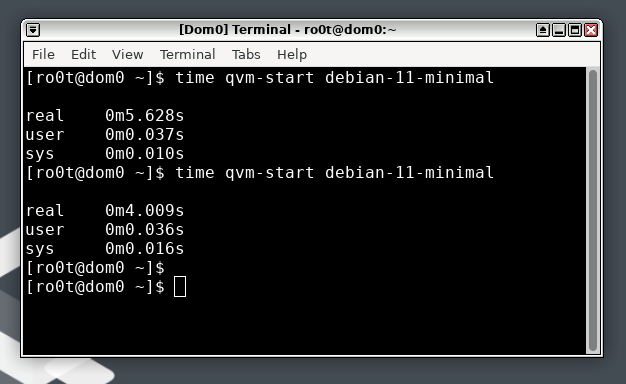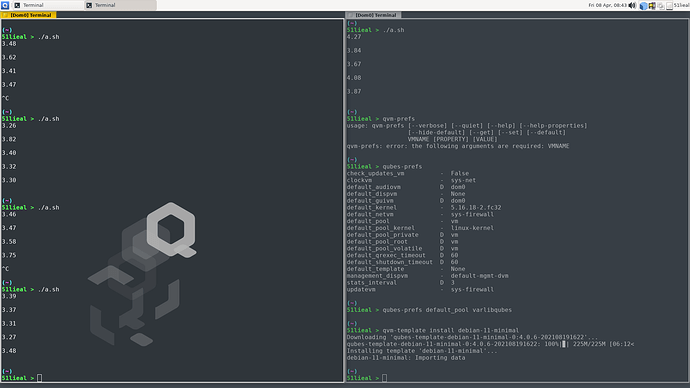I have run the tests again with xen_acpi_processor enabled:
Dom0 Kernel: 5.10.21-1CPU: AMD Ryzen Embedded V1605B (4 Cores/ 8 Threads @2.0Ghz with Turbo @3.6Ghz )Storage: Samsung 970 Evo Plus (M.2 NVMe PCIe 3.0)RAM: 32 GB DDR4 2400 Mhz (ECC)Release : R4.1
6.80
6.07
6.57
6.32
6.80
6.18
6.74
6.16
6.14
6.78
----------
Median: 6.445 (was: 6.305)
Mean: 6.456 (was: 6.488)
Variance: 0.096 (was: 0.258)
(Looking at the frequencies, I realized that it probably worked before. )
2 Likes
I presume it’s for R4.1?
If so, there’s probably something else slowing it down. I didn’t modify my xen_acpi_processor and I doubt @GWeck did either.
Since I no longer have R4.1, I sadly can’t test this theory
fiftyfourthparallel:
I presume it’s for R4.1?
That’s of course on R4.1. I have added that fact to my post, because I wrongly presumed that this was implied.
Maybe AMD works better/ different than Intel?
I knew–just wanted to be explicit for the sake of clarity. Thanks for fixing that
2 Likes
Given Intel’s general poor performance these years, it wouldn’t surprise me.
GWeck
April 9, 2021, 4:32pm
46
I just enabled xen_acpi_processor for R4.1 - thanks to @gust .Major known 4.1 gaps? - and got the following values:
7,347,547,617,457,347,257,557,447,577,20Mean: 7.43Median: 7.45Variance: 0.02
That’s pretty close to the values for R4.0, but without the large variances.
4 Likes
ddevz
August 22, 2021, 7:58pm
47
@GWeck
Do you have it running on a raspberry pi?? I know xen has already been ported and deployed for the raspberry pi, but i didn’t know anyone had ported qubes to it.
The answer is in the post above yours:xen_acpi_processor for R4.1"
GWeck
August 23, 2021, 10:15am
49
No - its an HP EliteBook 840 G4 - just a standard PC, originally intended for Windows 10.
deeplow
August 26, 2021, 11:27am
50
I ran the test for R4.1.0 using my i7-1065G7. The results weren’t as good as the original test on R4.0, but better than the R4.1 alpha tests.
I’ve updated the tables so all results that were run on the R4.1 Alpha ar clearly marked as such. Going forward, ‘R4.1’ refers to the stable release. I’ve also taken the liberty of removing minor version numbers for both kernels and versions since they just needlessly complicate things.
5.98
Mean: 6.08
Interesting thread, I wasn’t aware of it before.
But yes, 4.1 is slower according to my analysis as well [1], unfortunately for various reasons.
Actually I even wrote a tool just to measure it in more detail [2].
[1] 4.1 VM startup & qrexec performance issues · Issue #7075 · QubesOS/qubes-issues · GitHub GitHub - 3hhh/qubes-performance: Analyze Qubes OS VM startup performance.
1 Like
I’ve run several benchmark using fedora with several configuration, check here for interesting discussion
CPU : I7-10750H
Storage : WD SN 730 512GB
File System : LVM-XFS
Sector Size : 512b
Linux dom0 5.10.90-1.fc32.qubes.x86_64 #1 SMP Thu Jan 13 20:46:58 CET 2022 x86_64 x86_64 x86_64 GNU/Linux
# Boot speed
Startup finished in 4.897s (firmware) + 2.523s (loader) + 2.946s (kernel) + 8.787s (initrd) + 3.705s (userspace) = 22.861s
Startup finished in 4.868s (firmware) + 2.513s (loader) + 2.938s (kernel) + 8.817s (initrd) + 3.765s (userspace) = 22.902s
Startup finished in 4.874s (firmware) + 2.511s (loader) + 2.945s (kernel) + 8.255s (initrd) + 3.732s (userspace) = 22.318s
512b template fedora-34-full
# VM Boot
6.24
4.81
4.68
5.14
4.84
# Cryptsetup-reencrypt
Finished, time 15:24.011, 486745 MiB written, speed 526.8 MiB/s
CPU : I7-10750H
Storage : WD SN 730 512GB
File System : BTRFS+blake2b
Sector Size : 4kn
Linux dom0 5.10.90-1.fc32.qubes.x86_64 #1 SMP Thu Jan 13 20:46:58 CET 2022 x86_64 x86_64 x86_64 GNU/Linux
Startup finished in 4.898s (firmware) + 2.499s (loader) + 2.878s (kernel) + 7.922s (initrd) + 3.489s (userspace) = 21.688s
Startup finished in 4.878s (firmware) + 1.405s (loader) + 2.882s (kernel) + 7.936s (initrd) + 3.523s (userspace) = 20.626s
Startup finished in 4.889s (firmware) + 1.405s (loader) + 2.881s (kernel) + 7.817s (initrd) + 3.524s (userspace) = 20.518s
512b template fedora-34-full
#VM Boot
5.72
4.48
4.62
4.48
4.62
# directio
Finished, time 11:17.770, 486745 MiB written, speed 718.2 MiB/s
# no directio
Finished, time 12:32.743, 486745 MiB written, speed 646.6 MiB/s
CPU : I7-10750H
Storage : WD SN 730 512GB
File System : LVM+XFS
Sector Size : 4kn
Linux dom0 5.10.90-1.fc32.qubes.x86_64 #1 SMP Thu Jan 13 20:46:58 CET 2022 x86_64 x86_64 x86_64 GNU/Linux
Startup finished in 8.740s (firmware) + 2.472s (loader) + 2.947s (kernel) + 7.879s (initrd) + 3.588s (userspace) = 25.628s
Startup finished in 8.720s (firmware) + 2.469s (loader) + 2.947s (kernel) + 7.896s (initrd) + 3.679s (userspace) = 25.713s
Startup finished in 5.331s (firmware) + 2.479s (loader) + 2.947s (kernel) + 8.438s (initrd) + 3.619s (userspace) = 22.816s
512b template fedora-34-full
#VM Boot
5.75
4.60
4.59
4.61
4.59
4kn template fedora-35
#full-4096
3.77
3.89
4.03
3.86
3.90
#minimal-4096
3.68
3.67
3.62
3.79
3.68
#full-512b
3.62
3.70
3.82
3.58
3.62
# directio
Finished, time 13:27.041, 486745 MiB written, speed 603.1 MiB/s
# no directio
Finished, time 12:29.073, 486745 MiB written, speed 649.8 MiB/s
2 Likes
Not sure if its the CPU, but 3.x second VM startup times are impressive. I’m inclined to think its because you’re using Fedora since my i7-1065G7 is somewhat similar to yours. Are you planning on running the same test using Debian-11-minimal for comparison?
1 Like
Impressive indeed. @51lieal do you think you can add these results to the table on the first post ?
The same thought occured to me but the test is only for Debian, so putting Fedora results there makes things confusing
Sname
April 7, 2022, 5:54pm
58
First output is with all standard vms running.
Lenovo Legion Y540-17IRH-PG0
zithro
April 7, 2022, 7:39pm
59
Some thoughts, do you have memory ballooning for dom0 or the domUs ?xentop and watch -n 1 xl vcpu-list during the tests may give pointers.
Are you interested in any tests or only bare metal ?
left is debian, top right is 4kn fedora 35 minimal updated.
I’ll try build debian 4kn template and let see the difference.

